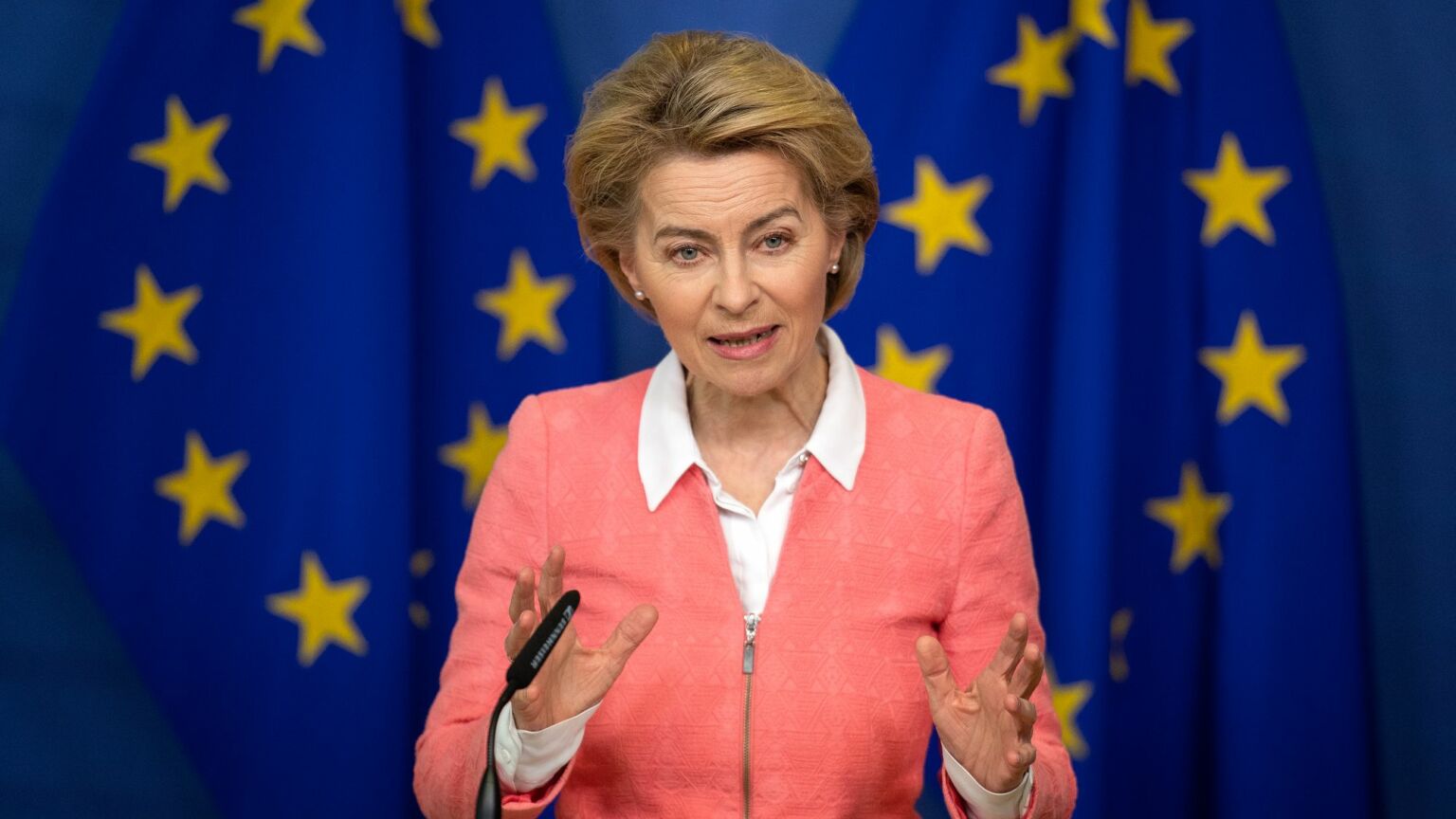Why Brexit Britain must rebuff Ursula’s advances
The Commission president is trying to drag us back into the EU’s orbit.

Want to read spiked ad-free? Become a spiked supporter.
It is clear that the appointment of ex-PM David Cameron as UK foreign secretary earlier this month has had an almost instant impact on the Foreign and Commonwealth Office. With a member of the Remainer establishment at its head, it now has the political air cover to return to its pre-Brexit ways and indulge its pro-Brussels inclinations.
As Allister Heath noted in the Telegraph this week, the return of Cameron has already emboldened the Foreign Office. Over the past few weeks, it has undermined Sunak’s pro-Israel stance, threatened to sabotage his efforts to tackle the small-boats crisis and adopted the most pro-EU tone since before the 2016 referendum.
But the cheers for Dave’s return in a Remainer-dominated Whitehall are nothing in comparison with the jubilation that has greeted it in Brussels.
And few Eurocrats have been as excited as Ursula von der Leyen, the president of the European Commission. It is no coincidence that, just a few short weeks after Cameron’s resurrection, von der Leyen has been eagerly claiming that the UK now appears to be on track to rejoin the EU.
Asked at the Politico 28 awards in Brussels whether Britain would ever become an EU member again, she began by characterising Brexit as a ‘goof up’ and appealing to the next generation. ‘I must say, I keep telling my children, “you have to fix it, we goofed it up, you have to fix it”‘. She then said that, in her personal opinion, the UK is now on a clear ‘direction of travel’ towards rejoining the EU.
You can see why she might think that. Keir Starmer’s Labour Party, clear favourites to win the next General Election, has made no secret of its desire to forge a closer relationship with the bloc. But it’s Cameron’s return that has really warmed von der Leyen’s heart. From the moment he returned to government, he started making eyes at the EU, promising to be ‘a friend, a neighbour and the best possible partner’.
This kind of public talk from the UK’s foreign secretary has clearly been music to the ears of von der Leyen. It means that in return she can talk openly about the UK being on track to rejoin the EU, without kickback from Foreign Office mandarins.
Britain rejoining the EU might be von der Leyen’s longer-term aim. But she has objectives to meet in the short term, too. Von der Leyen will see Cameron’s appointment as an opportunity to push hard for the UK to deepen its existing involvement with the EU’s Common Foreign and Security Policy. This includes the EU programme, PESCO – an acronym for ‘permanent structured cooperation’ in defence matters. The UK formally joined PESCO in November last year, despite concerns that doing so undermined the UK’s post-Brexit independence – the very independence, that is, that allowed the UK to sign up to Aukus, the trilateral security partnership for the Indo-Pacific, agreed between Australia, the UK and the US in 2021.
Von der Leyen and the EU’s defence establishment were livid with the Aukus deal at the time. It led to Australia scrapping a contract to buy submarines from France and strengthened the Anglosphere’s defence capacity at the EU’s expense. In its aftermath in 2021, von der Leyen even threatened to pull out of trade-deal talks with Australia.
But with the UK becoming more deeply involved in the EU’s own defence programme, and with Cameron in situ at the Foreign Office, the possibility of the UK striking another Aukus-style treaty is already unthinkable.
It really isn’t wise for the UK to be increasingly contracting out matters of deep strategic defence planning to the EU. After all, it undermines the UK’s ability to set its own security priorities and limits our ability to enter into defence relationships with other nations.
Then there’s the problem of von der Leyen herself. If any politician is not to be trusted on defence matters it is surely the European Commission president. After all, as Germany’s defence minister, von der Leyen not only oversaw the degradation of Germany’s military, she was also accused of cronyism and nepotism, having spent vast amounts of taxpayers’ money on external consultants. Conveniently, all of the evidence from her mobile phone had been deleted before an investigation could take place.
In fact, so embarrassed by their defence minister were Germany’s ruling Christian Democrats at the time that they were only too happy to shunt von der Leyen over to Brussels. It was a case of out of sight and out of mind.
There are many good reasons why the UK should resist ever further entanglement in the EU’s defence structures. But a big one right now is von der Leyen herself, a politician Germany itself wouldn’t trust with its own security.
Gawain Towler is a commentator, former director of communications for the Brexit Party and a consultant for Reform UK.
Picture by: Getty.
Who funds spiked? You do
We are funded by you. And in this era of cancel culture and advertiser boycotts, we rely on your donations more than ever. Seventy per cent of our revenue comes from our readers’ donations – the vast majority giving just £5 per month. If you make a regular donation – of £5 a month or £50 a year – you can become a and enjoy:
–Ad-free reading
–Exclusive events
–Access to our comments section
It’s the best way to keep spiked going – and growing. Thank you!










Comments
Want to join the conversation?
Only spiked supporters and patrons, who donate regularly to us, can comment on our articles.